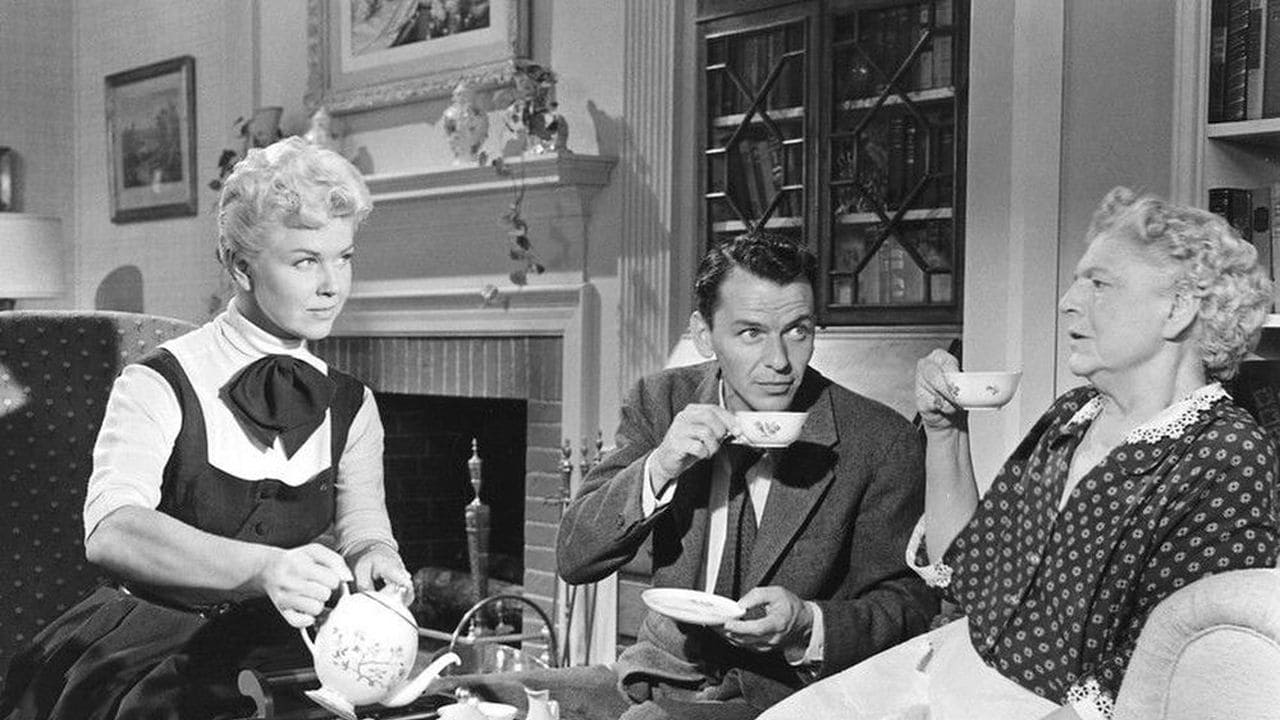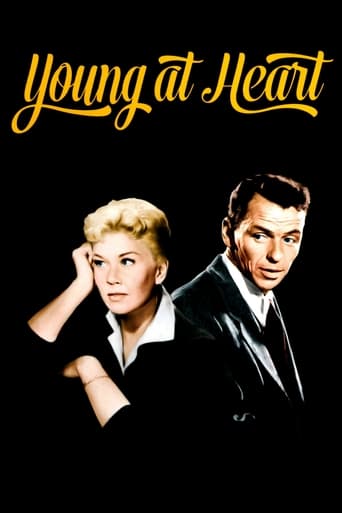

Wow! Such a good movie.
... View MorePurely Joyful Movie!
... View MoreEach character in this movie — down to the smallest one — is an individual rather than a type, prone to spontaneous changes of mood and sometimes amusing outbursts of pettiness or ill humor.
... View MoreExcellent and certainly provocative... If nothing else, the film is a real conversation starter.
... View More... and as a result, through the years, I've just remembered it fondly. This film is a remake of 1938's Four Daughters which had Priscilla Lane in Doris Day's part and John Garfield in Frank Sinatra's part as the morose pessimistic musician who believes if not for bad luck he'd have none at all. This one has not been televised in years because the elements are apparently in shabby shape and need restoration. MAJOR SPOILERS AHEAD. The film follows the plot of "Four Daughters" pretty closely, with Laurie (Doris Day) eloping with melancholy Barney Sloan (Frank Sinatra) in order to clear the way so that the man she really loved and was planning to marry (Gig Young as Alex) might fall in love with older sister Amy. Laurie decides to do this after she realizes Amy is in love with Alex.These attempts at manipulations of the heart seldom work out well, and such is the case here. Instead, Amy starts to see her long-time beau - who has always loved her - as the man for her precisely because of the way he takes charge of the chaos at the wedding after it has been discovered that Laurie has eloped with someone other than the intended groom. Thus Amy becomes engaged to her boyfriend, Alex is left unattached, Laurie is unhappy and trying to make the best of a bad situation, and her actual new husband Barnie is left feeling more like a failure than ever because he just knows he was second best plus now he feels like his bad luck is being imposed on his wife as well as himself.Where Young at Heart truly splits from Four Daughters is the ending. Barnie attempts suicide just like in Four Daughters, but Amy brings him back from the brink of death by telling him she really loves him plus one other secret which I'll leave as a surprise if you ever get a chance to see this movie. Another odd departure - there are only three daughters in this film, not four as in the original.
... View MoreA plot reminiscent of the Bennett family in "Pride and Prejudice," with, of course, Doris Day taking the role of Elizabeth Bennett. Similar ineffectual dad. All the daughters (three, this time) looking for Mr. Right. Only Ethel Barrymore as the aged aunt doesn't fit--she apparently mistook this for the set of "Long Day's Journey Into Night"--why is she there?But throw in a totally unlikely element--Frank Sinatra, and it works. Sinatra in his moody, intense prime, involved with--of all people--Doris Day. Does it get weirder than that? But Frank transfixes us with his soul, his magical voice and style, and we happily go along for the ride, and Doris' songs certainly aren't shabby, either.
... View MoreThroughout the 1930s and well into the 1940s musicals were inevitably lighthearted confections calculated to send the audience away filled with good cheer and humming a tune. In the late 1940s, however, a different type of musical emerged. The story was usually about a singer or a star or a musician, thus allowing plenty of room for the songs and production numbers the audiences expected--but far from being lighthearted, it was often a dark tale. It was, in a phrase, musical noir.Many performers took a turn in this genre, but there is really only one who did so consistently: Doris Day. Given her extremely popular comedies of the late 1950s and early 1960s, it is easy to forget that she had some serious acting chops--but home studio Warner Brothers was quick to spot her potential in this area and showcase it in such non-musicals as STORM WARNING. And although the studio certainly put her through many "light hearted musical" hoops, it also gave her several musicals in which her role was more dramatic than comic: MY DREAM IS YOURS, YOUNG MAN WITH A HORN, I'LL SEE YOU IN MY DREAMS--and in 1954 YOUNG AT HEART.The film is based on the 1938 FOUR DAUGHTERS and keeps much the same story. The Tuttles are a musical family: father Gregory (Robert Keith) and daughters Laurie (Doris Day), Fran (Dorothy Malone), and Amy (Elizabeth Fraser) are an instrumental quartet whose home lives are kept on even keel by non-musical Aunt Jessie (the legendary Ethel Barrymore.) When Laurie accepts a marriage proposal from handsome Alex Burke (Gig Young) it seems the most the family has to worry about is going from quartet to trio--a seemingly perfect set up for musical comedy. But Alex has a friend, and upon his arrival the story takes a dark turn indeed. The friend is Barney Sloan, a hard-knocks musician in poor health who soon has eyes for Laurie. And he is played by none other than Frank Sinatra.Just as it is easy to forget Day's skill as a dramatic actress, so too is easy to forget Sinatra's abilities as a dramatic actor. Like Day, Sinatra first came to the screen in a cream-puff movie: HIGHER AND HIGHER. But Sinatra was at MGM, and at MGM cream-puff musicals were the unalterable order of the day; it was not until a decade later that he dropped critical jaws with FROM HERE TO ETERNITY. The pairing of Day and Sinatra is a stroke of genius, and it is their chemistry upon which the major appeal of the film rests: they spark and sizzle as the pretty and very good girl and the forlorn, been-there-done-that guy. The paring is all the more effective due to unexpectedly solid support. Ethel Barrymore was a legendary actress, and at the time of this film she was largely confined to a wheelchair--but you would never know it from her remarkably effective performance as the acidic, knowing, and yet kindly Aunt Jessie. Gig Young and Dorothy Malone also score in their roles enough to make you wish they had more screen time.But the film has a flaw, and it is a major one. The film was originally intended as a very direct remake of FOUR DAUGHTERS--but Sinatra greatly disliked the original story's ending and insisted on a rewrite. The result is singularly unfortunate: the story builds toward a seemingly inevitable and very downbeat conclusion... only to suddenly shift into happy-ending-mode in a way that undercuts everything that has gone before. It's a tremendous pity; had it been otherwise, YOUNG AT HEART might well be considered one of the great films of its decade.Both Day and Sinatra would go on to other dramatic roles; Day would hit a highwater mark with LOVE ME OR LEAVE ME and THE MAN WHO KNEW TOO MUCH while Sinatra would dazzle even his worst critics with THE MAN WITH THE GOLDEN ARM. It's a great pity that they were never teamed again--but, and in spite of its unfortunate ending, YOUNG AT HEART not only gives us that teaming, it catches both of them on an upward curve surrounded by first rate talents. Recommended.GFT, Amazon Reviewer
... View MoreAlthough it is only heard sung by Frank Sinatra at the beginning and end credits of Young At Heart, the title song was both a big hit for Frank Sinatra and set the tone for a very warm and wonderful Yuletide picture.Warner Brothers already had this property, this is a remake of Four Daughters, minus a daughter, with Sinatra and Doris Day in the roles originated by John Garfield and Priscilla Lane. Doris's sisters are Dorothy Malone and Elizabeth Fraser who are all the daughters of music professor Robert Keith and all play instruments. The only non-musical member of their household is wise old maiden aunt, Ethel Barrymore.Of course Doris sings as well. But in the passing out of vocal material, Sinatra did a lot better than she did. None of her songs did anything for her vocal career. Sinatra wisely opted for standards by some of the very best. In his role as saloon singer/piano player/music arranger Frank gets to sing Just One of Those Things by Cole Porter, Someone to Watch Over Me by the brothers Gershwin and One For My Baby by Harold Arlen and Johnny Mercer. Can't get much more talented in the song department than that group.One For My Baby was introduced by Fred Astaire in The Sky's the Limit, but when Sinatra sang it here it became forever identified with him and a staple item at all of his live performances.Sinatra and Day sang a duet You My Love at the finale. It was the song that Frank was working on through out the film. They sang it so well that you'd never know that tempers flared the entire time the film was made.During the Forties when both were at Columbia Records, Frank and Doris recorded a couple of duets together. In the interim, Sinatra moved on to Capitol records so no original cast album could be made from this soundtrack. It might not have happened anyway because back in the Forties Day spoke highly of Frank. Things cooled considerably between the two of them, among the items of contention was Day's husband Martin Melcher. Suffice it to say it was not a happy set.Still and all Young at Heart is one of the best films either of the stars did and really nice entertainment.
... View More